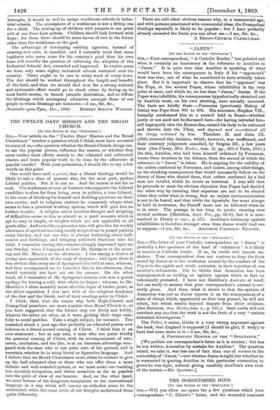THE TWELVE DAYS' MISSION AND THE BROAD CHURCH.
[To THE EDITOR OF THE " SPECTATOR"]
Sta,—Your article on the "Twelve Days' Mission and the Broad Churchmen" touches a question which I think must have occurred to many of us,—the question whether the Broad-Church clergy can, to use the popular phrase, influence the masses, or whether they must confine their efforts mainly to the educated and cultivated classes, and leave popular work to be done by the adherents of popular creeds? With your permission, I should like to say a few words on this point.
One would have said, a priori, that a liberal theology would be likely to suit a class of persons who, for the most part, profess Liberal politics. But it is not so. And the reason is not far to seek. The tradesman or man of business who supports the Liberal candidate is often far from being, even in politics, a true Liberal, in the sense of thinking for himself and deciding questions on their own merits ; and in religious matters he commonly adopts what seems to him a practical working system, which will give him no further trouble. A religion which involves thought and weighing of difficulties seems to him as absurd as a yard measure which is apt to vary in length, or weights which are not applicable to all goods alike. And so he likes a preacher who will give him his weekly allowance of spiritual teaching neatly weighed out in pound packets every Sunday, and not one who is always bothering about half- ounces and farthings, and bringing awkward fractions into his total. I remember having this contrast strongly impressed upon me one Sunday, when I happened to hear Mr. Spurgeon in the morn- ing and Mr. Maurice in the afternoon. I was among a cluster of young men apparently of the rank of shopmen ; and upon these it was evident that every one of Spurgeon's hits told at once, whereas, had they accompanied me to Lincoln's Inn in the afternoon, they would certainly not have sat out the sermon. On the other hand, all I remember of Mr. Spurgeon's sermon now was a quaint apology for having a cold, with which he began ; whereas, to Mr. Maurice's I often mentally recur after the lapse of twelve years, as the ablest exposition I ever met with of the religious tendency of the Jew and the Greek, and of their meeting-point in Christ.
I think, then, that the reason why both High-Church and Evangelical preachers are more popular than Broad Church is, as you have suggested, that the former step out freely and boldly, whereas the latter are often, as it were, nicking their steps care- fully to avoid puddles. Take a single subject, for instance. You remarked about a year ago that probably no educated person now believes in a literal second coming of Christ. I think that is an over-statement; but at any rate, a man who can paint vividly the personal coming of Christ, with its accompaniment of awe, terror, exultation, and the like, is at an immense advantage com- pared with the man who is not quite sere of his ground, and is uncertain whether he is using literal or figurative language. And I believe that we Broad Churchmen must either be content to give up the half-educated class to those who can offer them a more definite and well-rounded system, or we must make our teaching less minutely scrupulous, and throw ourselves as far as possible into the point of view of our hearers. And, on the other hand, we must beware of the dangerous temptation to use conventional language in a way which will convey an orthodox sense to the uninitiated, while the inner circle of our disciples understand them quite differently. There are still other obvious reasons why, in a commercial age, and with persons penetrated with commercial ideas, the Evangelical theology especially is likely to be popular ; but I have probably already exceeded the limits you can allow me.—I am, Sir, &c.,
A BROAD-CHURCH CLERGYMAN.


































 Previous page
Previous page